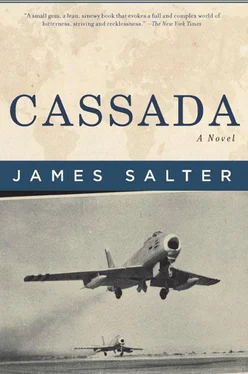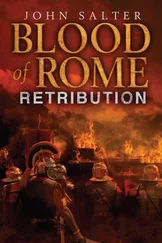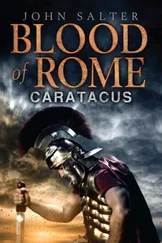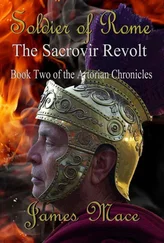“Damn it,” Cassada said in disbelief. “Where’s the yellow?”
Finally Harlan found one at the very bottom near the edge.
“Here you are,” he said.
Cassada stood helplessly. It was as if he had lost the power to move.
“Here you are, dead-eye,” Harlan said. “You’re right. You did hit it.”
Cassada looked at the single hole. He seemed dazed. He took the fabric in his hand.
“I can’t understand it,” he said.
“You had a good airplane,” Isbell said. “You were probably firing out of range.”
Cassada shook his head.
“How do you know?”
“No, sir. I was in there.”
“Well, you were doing something wrong.”
“I can’t understand it. I did everything right. I had the right airspeed, the G’s. The pipper was right on.”
“We’ll have to look at your film.”
“I forgot. It’s still out in the airplane.”
“You’d better go get it before it gets lost.”
Looking at the ground, carrying all the disappointment he could bear, Cassada walked towards the ramp. Phipps had picked up the clipboard and was marking down the hits as Harlan called them out. Blue. Red. Blue. Three reds. Blue. When they had finished, Isbell had forty-six and Harlan forty. A crowd had gathered around to watch the scoring. It was the best target thus far.
“Damn fine shooting,” Wickenden commented.
Dunning strolled up with a cup of coffee in his hand. They were unhooking the target.
“Just a minute, gentlemen, just a minute. Let it hang up there for a while. Give these other squadrons a chance to look at it.”
He picked up the score sheets. He was reading them when Cassada came back. Dunning did not look up.
“Were you firing on this one, Lieutenant?” he asked blandly.
“Yes, sir.”
“What color?”
“Yellow.”
“I don’t see too many yellow hits here,” Dunning said, pursing his mouth speculatively. “What seemed to be the trouble, bad sight?”
“No, sir,” Cassada said. “The sight was good.”
Dunning waited.
“Major, I don’t understand it,” Cassada admitted.
Dunning made a slight sound of acknowledgement.
“Oh, let’s face it,” Harlan muttered. “You’re not about to hit anything.”
Cassada looked at him, unable to speak. The words were jammed in his throat.
“What did you get?” he said. His cheekbones were burning.
“I don’t know,” Harlan shrugged. “Forty-eight percent. Something like that.”
Cassada stood there, humiliation coloring his fairness.
“Good enough for you?” Harlan said. He was dropping the pebbles from one hand to the other.
“I’ll beat it,” Cassada said.
Dunning was watching with a cool, remote smile.
“You will, eh?” Harlan said.
“Yes, I’ll beat it.”
“You’ll be lucky if you even qualify.”
Cassada’s hands were trembling. He had put them in his pockets.
“I’ll beat any score you make,” he said.
“Just put up your money.”
Cassada stood there. He tried to think for a moment of what he was doing. Harlan was pouring the pebbles from hand to hand. That was the only sound. The vehicles passing, the aircraft engines being started, all of it seemed far off.
“Well?”
“All right,” Isbell broke in. He was about to say, that’s enough, but Dunning lifted a hand in restraint.
“Look…” Isbell nevertheless began.
“Captain Isbell,” Dunning warned.
“I’ll bet,” Cassada said. “How much?”
“Just whatever you want,” Harlan said.
“Fifty dollars.”
Isbell was shaking his head in disgust.
“Hell. Is that all?” Harlan said.
“I’ll bet whatever you want to bet. A month’s pay. Is that good?”
“Yours or mine?”
“I don’t care. Yours,” Cassada said.
Harlan sniffed calmly. He dropped the pebbles he was holding to the ground. “All right, that’s a bet.” He held out a hand.
Cassada ignored it. “My word’s enough,” he said.
“Your word, hell. Shake on it.”
Cassada didn’t move. “You have enough witnesses,” he said.
He stayed at the target afterwards, alone, staring at it as one might at some construction where everything had gone wrong. Isbell went back into the operations hut. Wickenden followed him.
“That’s about what I would expect of him,” Wickenden said. “Didn’t surprise me at all. He’s a fool.”
“Somebody should have stopped them. I wanted to,” Isbell said.
“What for?” Wickenden said. “That’s the only way someone like that ever learns.”
In Sunday quiet, in the creaking of canvas, Wickenden lay on his cot reading. When he turned a page he folded it back, doubled, so he could hold the book in one hand. With the other he brushed at his arm or leg from time to time, at an annoying fly. Dumfries sat writing a letter. From the next tent a voice occasionally drifted over, a voice that was confiding to Grace, confessing to him. He had to hit—something like that—it was hard to make out the exact words. In any case, Wickenden ignored them and the slight they represented. He read on.
Idle Sundays. Dunning was off playing golf with the group commander and group ops on a course that was mostly sand dunes. Godchaux and Phipps had driven the silken black road that ran along the coast—the same road on which the guns and sun-baked armor of the Afrika Korps and British Eighth Army had fought back and forth—to one of the ruins, Leptis Magna, with its chalk-white columns and vacant amphitheater scorched by the sun, a great tumbled quarry near the sea. He and Phipps wandered the wide avenues. The Romans had built three cities along the coast, Phipps explained. “Tripoli, three cities. That’s what it means.”
“Is that right? Where’d you find that out?”
“Sabratha is the other one.”
“Why’d they build this? What did they do here?”
“This was a big city. Everything.”
“Let’s go this way,” Godchaux said. He had seen a man and two girls walking along a nearby street of what, ages past, had been shops.
They turned out to be Italian and stopped for a moment. One of the girls, dark-haired, was wearing a tight top, a sailor’s shirt. She stood with the sunlight gleaming on her while Godchaux tried to make conversation, but none of the three spoke English.
“You know any Italian?” Godchaux turned to Phipps.
“Cunati does.”
“That’s not going to help us. So, listen,” he said to the Italians, “you live here, in Tripoli?”
They didn’t understand, however, and wandered off. Godchaux watched them. The shirt was above white pants, also tight. “Jesus Christ,” he said.
“Let’s go down to the harbor,” Phipps said.
“Yeah. You can throw me in.”
“What for?”
“Take a cold shower. That’s what they used to say.”
“The girl?”
“Jesus.”
They wandered on. The sea was strewn with brown sea grass. They didn’t catch sight of the trio again.
Harlan and Ferguson were in town at the Del Mahari, sitting among the short dark men in business suits and the heavy-looking women. Cassada had been over talking to Grace about gunnery again, Ferguson commented.
“Oh, yeah?”
“He’s really focused on it.”
“Is that right? Well, he can talk all he wants.” Harlan was reading the menu. “The bird that talks the most is the parrot,” he added, “and it can’t fly.”
“ Teniente? ” the waiter asked.
“I’ll take the sirloin, rare. Capisce? Rare.”
“I’ll have the same thing,” Ferguson said. He was wearing sunglasses. His blond hair looked dirty. He was the same size as Harlan but more amiable. Everyone liked him.
Читать дальше












